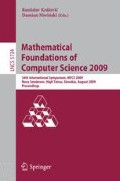Abstract
In many areas of computer science entities can “reproduce”, “replicate”, or “create new instances”. Paramount examples are threads in multithreaded programs, processes in operating systems, and computer viruses, but many others exist: procedure calls create new incarnations of the callees, web crawlers discover new pages to be explored (and so “create” new tasks), divide-and-conquer procedures split a problem into subproblems, and leaves of tree-based data structures become internal nodes with children. For lack of a better name, I use the generic term systems with process creation to refer to all these entities.
Access this chapter
Tax calculation will be finalised at checkout
Purchases are for personal use only
Preview
Unable to display preview. Download preview PDF.
References
Athreya, K.B., Ney, P.E.: Branching Processes. Springer, Heidelberg (1972)
Blumofe, R.D., Leiserson, C.E.: Scheduling multithreaded computations by work stealing. Journal of the ACM 46(5), 720–748 (1999)
Brázdil, T., Esparza, J., Kiefer, S., Luttenberger, M.: Space-efficient scheduling of stochastically generated tasks. Technical report, Technische Universität München, Institut für Informatik (April 2009)
Dwass, M.: The total progeny in a branching process and a related random walk. Journal of Applied Probability 6, 682–686 (1969)
Esparza, J., Kiefer, S., Luttenberger, M.: Convergence thresholds of Newton’s method for monotone polynomial equations. In: STACS 2008, pp. 289–300 (2008)
Etessami, K., Yannakakis, M.: Recursive markov chains, stochastic grammars, and monotone systems of nonlinear equations. Journal of the ACM 56(1), 1–66 (2009)
Harris, T.E.: The Theory of Branching Processes. Springer, Heidelberg (1963)
Johnson, N.L., Kotz, S.: Urn Models and Their Application. John Wiley & Sons, Chichester (1977)
Kiefer, S., Luttenberger, M., Esparza, J.: On the convergence of Newton’s method for monotone systems of polynomial equations. In: STOC 2007, pp. 217–226. ACM, New York (2007)
Lindvall, T.: On the maximum of a branching process. Scandinavian Journal of Statistics 3, 209–214 (1976)
Mahmoud, H.: Pólya Urn Models. CRC Press, Boca Raton (2008)
Nerman, O.: On the maximal generation size of a non-critical galton-watson process. Scandinavian Journal of Statistics 4(3), 131–135 (1977)
Author information
Authors and Affiliations
Editor information
Editors and Affiliations
Rights and permissions
Copyright information
© 2009 Springer-Verlag Berlin Heidelberg
About this paper
Cite this paper
Esparza, J. (2009). Stochastic Process Creation. In: Královič, R., Niwiński, D. (eds) Mathematical Foundations of Computer Science 2009. MFCS 2009. Lecture Notes in Computer Science, vol 5734. Springer, Berlin, Heidelberg. https://doi.org/10.1007/978-3-642-03816-7_3
Download citation
DOI: https://doi.org/10.1007/978-3-642-03816-7_3
Publisher Name: Springer, Berlin, Heidelberg
Print ISBN: 978-3-642-03815-0
Online ISBN: 978-3-642-03816-7
eBook Packages: Computer ScienceComputer Science (R0)

